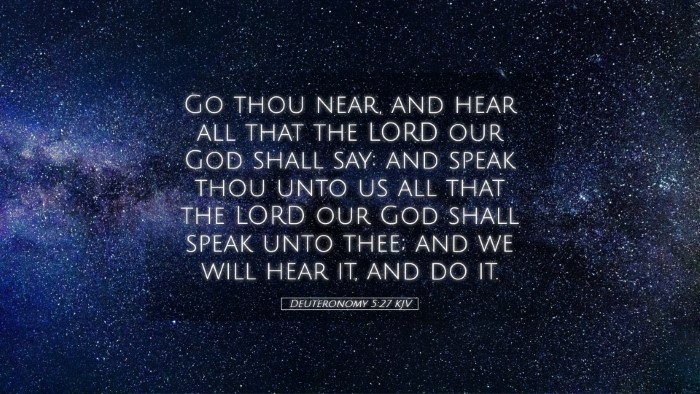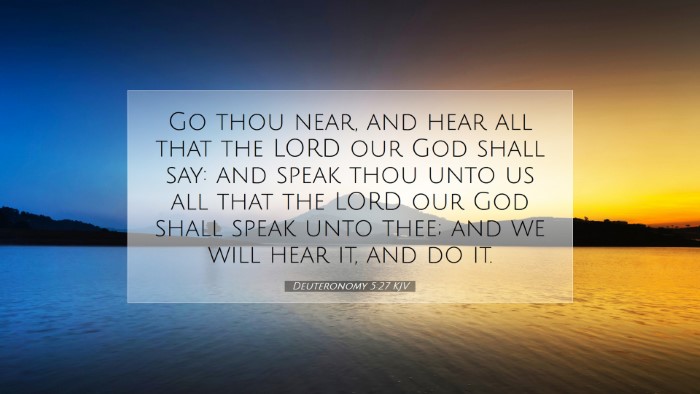Commentary on Deuteronomy 5:27
Verse: "Go thou near, and hear all that the Lord our God shall say; and speak thou unto us all that the Lord our God shall speak unto thee; and we will hear it, and do it." (Deuteronomy 5:27, KJV)
Introduction
This passage reflects the response of the Israelites to God's voice from the mountain, where they were overwhelmed by His majesty and fearful of His power. The juxtaposition of divine instruction and human willingness offers rich theological insights that matter significantly for modern readers, especially those involved in ministry and scholarship.
Theological Themes
- Divine Communication: The importance of hearing God's word as a divine imperative is emphasized.
- Human Responsibility: The commitment of the Israelites to obey God's command highlights the necessary response of faith.
- The Role of Mediators: The request for Moses to mediate God's word illustrates the concept of intermediary roles in faith journeys.
Commentary Insights
Matthew Henry
Matthew Henry notes the essential role of the mediator in communicating God’s laws and expectations to the people. He emphasizes that the Israelites recognized their inability to approach God directly, acknowledging His holiness and their own sinful state. This mediator, Moses, becomes a type of Christ, reflecting the ultimate role of Jesus in bridging the gap between God and humanity.
Albert Barnes
Albert Barnes offers a detailed reflection on the implications of the Israelites’ request. He argues that this verse shows a commendable heart in the people desiring to hear the Word of God. Barnes draws attention to the communal aspect of faith expressed in their willingness to hear and obey collectively. This speaks volumes to the church today regarding the importance of community in understanding and following God's commands.
Adam Clarke
Adam Clarke provides an analytical approach, exploring the cultural and historical context of the passage. He reflects on the significance of the people’s request to Moses, highlighting that it was rooted in reverence and fear of the Lord. Clarke's commentary posits that this illustrates the overwhelming nature of divine revelation and the people’s recognition of their need for guidance. He suggests that this dependency on God’s word is still relevant today as believers navigate their spiritual journeys.
Practical Applications
- Listening to God: The exhortation to "hear" God emphasizes the need for active listening in prayer and scripture study.
- Community Obedience: The acknowledgment that they would "do it" reflects corporate responsibility in obeying God’s word.
- Mediation in Ministry: Pastors and leaders today are called to be mediators of God’s word, following the example set by Moses.
Conclusion
Deuteronomy 5:27 serves as a powerful reminder of the dynamics of divine communication and human response. For pastors, students, theologians, and scholars, it invites reflection on the importance of listening to God and acting upon His words, as well as the vital role of mediation in spiritual leadership. This verse encapsulates a timeless principle: that God speaks, and His people have the duty and privilege to respond in reverence, obedience, and faithfulness.


